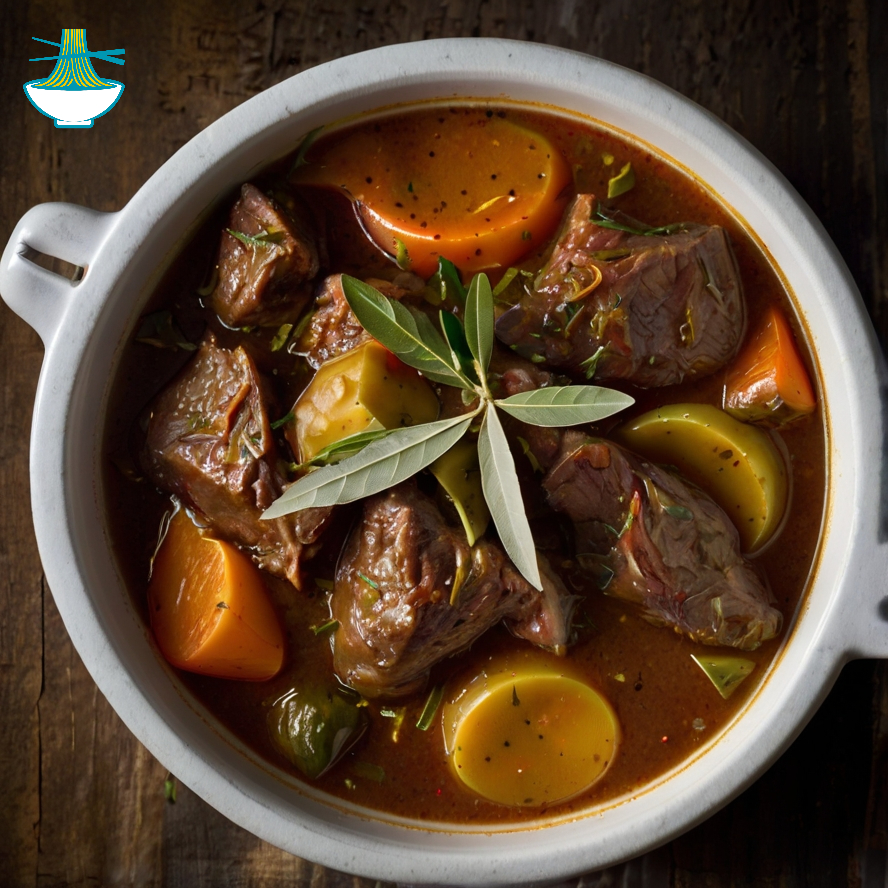Botswana Seswaa is a traditional stew made with beef or goat meat, slow-cooked to tender perfection. Often served at special occasions and gatherings, Seswaa symbolizes community and togetherness. It is typically enjoyed with Pap, a thick maize porridge, and traditionally eaten with hands using Pap to scoop up the stew.

Ingredients:
- 1-2 pounds beef or goat meat
- 1 large onion, chopped
- 3 garlic cloves, minced
- 2 bay leaves
- 1 teaspoon salt
- Water
- Oil for cooking
Instructions:
1. Prepare the Meat: Clean the meat by trimming excess fat and cutting it into small pieces.
2. Sauté Onions and Garlic: Heat oil in a large pot over medium-high heat. Add chopped onions and minced garlic, cooking until softened.
3. Brown the Meat: Add the meat to the pot and brown it on all sides.
4. Cook the Stew: Pour enough water into the pot to fully cover the meat. Add bay leaves and salt. Bring to a boil, then reduce heat to low and simmer for several hours until the meat is tender and falling apart.
5. Shred the Meat: Remove bay leaves. Use a fork or masher to shred the meat into fine pieces.
6. Prepare the Pap: In a separate pot, boil water. Gradually add maize meal while continuously stirring until thickened. Cook for an additional 10-15 minutes.
7. Serve: Traditionally, Seswaa is eaten with the hands, using Pap to scoop up the stew.
Notes:
- For added nutrition and flavor, consider including vegetables such as carrots or cabbage in the stew.
- The Pap can be adjusted in thickness to personal preference and flavored with ingredients like milk or butter if desired.
Nutritional Information:
Botswana Seswaa is rich in protein and provides substantial energy. It is high in fat, so it should be consumed in moderation. Opting for leaner cuts of meat or incorporating more vegetables can make the dish healthier.

Nutrition Value:
1. 1-2 pounds beef or goat meat
- Calories: 380 per 3.5 ounces (100 grams)
- Carbohydrates: 0 grams
- Protein: 26 grams
- Fat: 30 grams
- Sodium: 60 milligrams
- Cholesterol: 70 milligrams
- Vitamins: B12 (important for nerve function and red blood cell formation)
- Minerals: Iron (supports red blood cell production), Zinc (essential for immune function)
- Nutritional Benefit: Provides high-quality protein and essential minerals, supporting muscle growth and overall health.
2. 1 large onion, chopped
- Calories: 45 per 3.5 ounces (100 grams)
- Carbohydrates: 11 grams
- Protein: 1 gram
- Fat: 0 grams
- Sodium: 4 milligrams
- Cholesterol: 0 milligrams
- Vitamins: Vitamin C (boosts immune system), Vitamin B6 (important for brain health)
- Minerals: Potassium (helps regulate blood pressure), Manganese (aids in metabolism)
- Nutritional Benefit: Offers antioxidants and vitamins that support immune health and metabolic processes.
3. 3 garlic cloves, minced
- Calories: 13 per 3 cloves
- Carbohydrates: 3 grams
- Protein: 0.6 grams
- Fat: 0 grams
- Sodium: 1 milligram
- Cholesterol: 0 milligrams
- Vitamins: Vitamin C (antioxidant properties)
- Minerals: Manganese (supports metabolism), Calcium (important for bone health)
- Nutritional Benefit: Contains compounds with anti-inflammatory and antimicrobial properties, supporting overall health.
4. 2 bay leaves
- Calories: 6 per leaf
- Carbohydrates: 1 gram
- Protein: 0.2 grams
- Fat: 0 grams
- Sodium: 0 milligrams
- Cholesterol: 0 milligrams
- Vitamins: Vitamin A (supports vision), Vitamin C (boosts immunity)
- Minerals: Calcium (strengthens bones), Iron (supports blood health)
- Nutritional Benefit: Provides antioxidants and enhances the flavor of dishes without adding calories.
5. 1 teaspoon salt
- Calories: 0
- Carbohydrates: 0 grams
- Protein: 0 grams
- Fat: 0 grams
- Sodium: 2,300 milligrams
- Cholesterol: 0 milligrams
- Vitamins: None
- Minerals: Sodium (important for fluid balance and nerve function)
- Nutritional Benefit: Essential for maintaining fluid balance and proper nerve function, but should be used in moderation to avoid excessive sodium intake.
6. Water
- Calories: 0
- Carbohydrates: 0 grams
- Protein: 0 grams
- Fat: 0 grams
- Sodium: 0 milligrams
- Cholesterol: 0 milligrams
- Vitamins: None
- Minerals: None
- Nutritional Benefit: Essential for hydration and maintaining bodily functions.
7. Oil for cooking
- Calories: 120 per tablespoon
- Carbohydrates: 0 grams
- Protein: 0 grams
- Fat: 14 grams
- Sodium: 0 milligrams
- Cholesterol: 0 milligrams
- Vitamins: Vitamin E (antioxidant properties)
- Minerals: None
- Nutritional Benefit: Provides healthy fats and can enhance the absorption of fat-soluble vitamins.


Comments